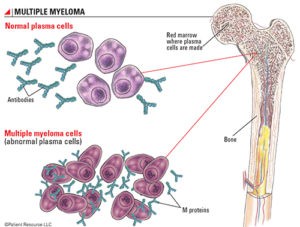“Cure vs control (in multiple myeloma) is debated because the strategies currently being tested are not truly curative but rather are intended to maximize response rates…”

You have been diagnosed with MM or your MM has relapsed. Your oncologist recommends “standard-of-care” multiple myeloma treatment for you.
He/she uses words and phrases like “curative intent” or “operational cure.” You assume that the oncologist is recommending the MM treatment regimen because research and his/her experience has shown that you have a reasonable chance at a cure, right?
That all depends on how you both define “cure.”
My definition of a MM cure is that I die of something else a long time from now. Conventional oncology’s definition of cure is five years from your diagnosis of MM.
More importantly, is your goal quality-of-life or quantity-of-life? Standard-of-care multiple myeloma therapies do not provide both. Aggressive therapies with “curative intend” bring a much higher risk of short, long-term and late stage side effects. Less aggressive regimens designed to “control” your MM bring much less risk of side effects.
You and your oncologist must determine your goals and therefore your therapy plan to attempt to achieve either-or but not both.
According to the articles linked and excerpted below, the FDA has approved chemotherapy based on any of the four phrases listed below:
- Event-free survival
- Progression-free survival
- Overall survival
- tumor response rate
In the complicated world of conventional oncology for multiple myeloma patients, a MM patient can take an expensive, toxic drug, that kills cancer yet may not may not extend your life longer than predicted. That’s correct. You can kill cancer cells only to have them re-grow and kill you anyway.
This happened to me. I was diagnosed with multiple myeloma (MM) in 1994. I had an autologus stem cell transplant in 12/95. I achieved partial remission after my ASCT yet relapsed 10 months later. I live with the long-term and late stage collateral damage from that ASCT to this day.
An experimental, non-toxic therapy put me into complete remission where I have remained since early 1999. My experience as a MM survivor and MM coach is that MM patients must undergo a combination of conventional/traditional and evidence-based non-conventional therapies in order to manage their MM.
My point is that in order to avoid what I went through each MM patient must ask his/her oncologist what the recommended therapy is expected to do.
To learn more of the potential pitfalls of conventional cancer, scroll down the page, post a question and I will reply ASAP.
Thank you,
David Emerson
- Multiple Myeloma Survivor,
- MM Cancer Coach,
- Director PeopleBeatingCancer
Recommended Reading:
“Although not often openly acknowledged, “cure vs control” is the dominant philosophical difference behind many of the strategies, trials, and debates related to the management of myeloma.
Should we treat patients with myeloma with multidrug, multitransplant combinations with the goal of potentially curing a subset of patients, recognizing that the risk of adverse events and effect on quality of life will be substantial?
Or should we address myeloma as a chronic incurable condition with the goal of disease control, using the least toxic regimens, emphasizing a balance between efficacy and quality of life, and reserving more aggressive therapy for later?…
Myeloma is generally not considered a curable disease; however, new definitions of cure have been suggested, including operational cure, which is defined as a sustained complete response (CR) for a prolonged period.1,2
Cure vs control is debated because the strategies currently being tested are not truly curative but rather are intended to maximize response rates in the hope that they will translate into an operational cure for a subset of patients…
“In approving new cancer drugs, the US Food and Drug Administration (FDA) is now heavily relying on surrogate markers of effectiveness, such as tumor shrinkage, instead of proof that an agent improves survival, according to a new analysis…
Their analysis showed that 36 of 54 (67%) cancer drug approvals from 2008 to 2012 were made on the basis of surrogate markers — either tumor response rate or progression-free survival, in about equal frequency…
But over a median follow-up period of 4.4 years, only five of those 36 drugs were shown, in randomized studies, to improve overall survival…
Dr. Prasad said he believes that patients need to intervene on their own behalf to learn whether they are getting a truly valuable therapy…
“Patients with cancer should ask their doctor if the drugs they are offered have been shown to improve survival or quality of life or merely a surrogate. This information may be helpful as they try to balance the side effects and benefits of a treatment and make healthcare choices that are right for them,” he said.”



